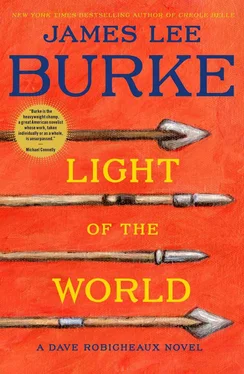I slung the M-1 on my shoulder and climbed the ladder that Surrette and Jack Boyd had used to escape the basement. It protruded through a trapdoor into a pantry just off the kitchen; the trapdoor looked like it had been sawed and hinged recently. I went through the first floor of the house, then climbed the stairs and searched the same rooms Clete had searched. Surrette and Boyd were gone. But where? We hadn’t heard a vehicle drive away or any sound of a motorized boat on the lake.
I went out on a balcony that allowed a fine view of the grounds and the work sheds and the cherry trees, heavy with fruit. I realized a surreal phenomenon had taken place while we were in the basement, one that seemed to have no cause. I had heard about the northern lights, although I was never sure what they were. I also had been in parts of the world — the Bermuda Triangle and a similar nautical area off the coast of Japan — where the laws of physics didn’t always apply and electromagnetic influences seemed to have their way with compasses and gyroscopes and radar and even the creation of whirlpools and tidal waves.
This was different. The moon had disappeared, either behind a mountain peak or in a bank of thunderheads pushing down from British Columbia. By all odds, the lake and the mountains that surrounded it should have been submerged in darkness. That was not what happened. There was a ubiquitous glow from the other side of the mountains. It was cobalt blue and seemed to emanate from the land into the sky, rather than the other way around. The lake itself, which was vast and deep and, even in July, cold enough to pucker your skin, was absolutely black and yet brimming with nocturnal radiance.
I wondered if my fatigue and adrenaline and revulsion had impaired both my senses and my ability to think. I was convinced that was not the case. I’m also convinced that all the events I was about to see and participate in happened just as I will describe them. I have never set much store in psychological stability or what we refer to as normalcy. I don’t believe the world is a rational place; nor do I believe that either science or the study of metaphysics can explain any of the great mysteries. I have always fled the presence of those who claim they know the truth about anything. I agree with George Bernard Shaw’s statement that we learn little or nothing from rational people, because rational people adapt themselves to the world and, consequently, are seldom visionary.
I went downstairs holding the M-1 at port arms and walked through the French doors into the yard. The lights were off at the marina, but the hulls of the sailboats in their slips were white and sleek in the chop, rocking softly against the rubber tires hung from the mooring posts. Had not at least one person inside a cabin on one of those boats been alarmed by the gunfire and used a landline to call in a 911? Perhaps they had. Or perhaps no one was in the boats. Or perhaps they couldn’t have cared less.
I saw Clete walking toward me, Gretchen’s jungle-clipped AR-15 slung over his right shoulder. “Where are Molly and Albert?” he asked.
“With the girls on the back steps. Molly was opening up some canned food,” I replied.
He nodded and looked around, his eyes sweeping the lakeshore and the shadows by the work sheds and the cherry trees puffing in the wind. “It’s cold,” he said. “None of them have wraps.”
“You want to pack it in?”
“Surrette is still out here. If we leave, he skates. Let Molly and Albert take Felicity and the girls to the hospital in Polson.”
“I don’t like them being on the highway by themselves,” I said.
“You’ve got a point.”
“Let’s search the sheds and the orchards and the cottage where the wrecker is parked,” I said.
He nodded again, then I saw his expression change as he gazed up the slope toward the two-lane. “Fuck,” he said.
Three sets of headlights were coming down the grade from the southern end of the lake. The first vehicle slowed and turned into the driveway that led down to the two-story stone house. The other two turned with it. None of the vehicles had emergency flashers. The drivers cut their headlights before they reached the stone house. In seconds, the three vehicles had disappeared among the work sheds and orchards.
“You were right,” Clete said. “It’s Caspian Younger. He’s about to inherit billions, and we’re the only thing standing in his way. How did we let these motherfuckers get behind us?”
Because I didn’t listen to my old friend the line sergeant, I thought.
“What do you want to do, Streak?”
“Like you said.”
“What did I say?”
“Blow up their shit,” I replied.
Clete and I began walking toward the work sheds that were located on the far side of two cherry orchards that sloped from the two-lane down to the water’s edge. The bandolier of .30–06 clips clinked softly against my back. He was carrying the AR-15 with his right hand wrapped in the pistol grip, the butt against his hip. “I’ve got a bad feeling about this place, Streak.”
“Why?”
“I don’t know how to put it. It’s ancient country. It’s like it’s full of ghosts, like we stumbled into something a lot bigger than us.”
“Don’t think that way. A perp is a perp. Like you always said, bust them or dust them. We’re the good guys; they’re not.”
“Sounds good. Except you know better,” he said. “Surrette is the real deal, Dave.”
“What do you mean?”
“A guy you can’t put a label on. A guy who was allowed to go on killing people for over twenty years. How’d we get into this shit? Why us? It’s like we didn’t have a choice, like we were supposed to meet up with this guy.”
I did not want to dwell on the implications. Clete was not one given to extravagant rhetoric. The fact that he had said what he said made my breath come short in my chest.
We continued through the orchard, fifteen feet apart. The first shed was a long weathered building shaped like a boxcar, with a peaked, shingled roof. Through the trees, I could see two SUVs and a Chrysler parked on a gravel roadway. Eight or nine men had gathered by the car. Both Clete and I sank to one knee and remained motionless inside the orchard, the branches waving above us, shadows shifting back and forth on our bodies.
The wind is the enemy of every infiltrator in a wooded area; when it blows, everything moves except the infiltrator. The other enemy is the reflection of light on your face. Clete and I lowered our heads and stared at the ground. We could hear one man addressing the others. There was no mistaking the imperious tone and its implicit sense of entitlement and authority. I’m sure that in Caspian Younger’s mind he was not only a leader of men with the bodies of gladiators whose lives had been characterized by hardship and the violent ethos of mercenaries; he was also their brother-in-arms and knew their needs and commanded their respect. I am sure that Caspian Younger believed he was a man among men.
As I looked at his Australian flop hat, and the cargo pants tucked into his fur-lined suede boots, and the long-sleeved flannel shirt and quilted vest, and his arms that were like pipe cleaners, I wondered if he had any idea at all of the ridiculous figure he cut. His subordinates probably laughed at him behind his back. His hands were on his hips as if he were a senior officer addressing his troops. We could hear every word he said.
“Listen up, you guys. You are now in my employ as licensed private investigators and security personnel,” he said. “We are stopping a crime in progress. We are rescuing two innocent teenage girls. I believe my wife is already dead. Before the sun rises, everyone on this property except the two girls may be dead also. That is not our intention, but that is probably what will happen.”
Читать дальше












